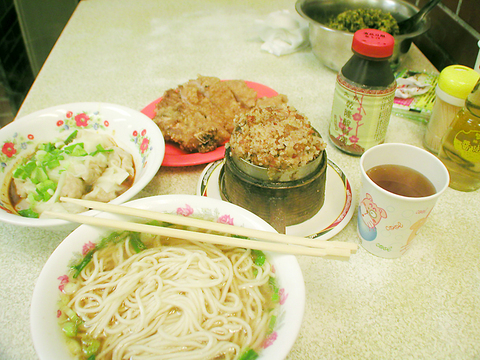When the mercury dips to the lows we've seen in the past few weeks, maybe the best ways to beat back the blues and warm up the soul is to tuck into a massive bowl of beef-noodle soup.
There's any number of beef-noodle joints around town to satisfy a quick hankering for beef-noodle soup, but only a few have made this northern Chinese specialty an art form. One of these is Yong-Kang Beef Noodle off Yongkang Street.
Now into its third generation, this noodle shop is almost as much of a neighborhood landmark as Ting-Tai-Feng (

PHOTO: MAX WOODWORTH, TAIPEI TIMES
As might be expected, Yong-Kang Beef Noodle is famed for its namesake, which it serves in an extra-spicy, scallion filled stock with fatty chunks of beef that are several mouthfuls each. The meat is perfectly tender and could practically serve as a meal on its own. But the noodles are also wonderfully tasty, as they're cooked to that perfect texture that makes them not too soft and not too chewy.
This seems like a simple point, but the number of noodle joints that skimp on their noodle selection, or simply don't cook them right makes it worth mentioning.
Yong-Kang Beef Noodle fills out its menu with other noodle staples, such as cow-tendon noodles and pork-chop noodles. The former is served in the store's beloved beef broth, while the pork offering comes in a clear but hearty pork stock that, relative to the more popular beef soup, is a tad light.
For this review, my two companions and I also ordered the chao-shou (
More on the mark was the pork rib steamed in rice on a bed of sweet potato. Served in a tiny steamer, the spices blended into the rice complement the meat beautifully, while the sweet potato brings balance to the flavors with its mild hint of sweetness.
After all the spices and heavy flavors, to restore calm to buzzing taste buds try the Qianlong (

Beijing’s ironic, abusive tantrums aimed at Japan since Japanese Prime Minister Sanae Takaichi publicly stated that a Taiwan contingency would be an existential crisis for Japan, have revealed for all the world to see that the People’s Republic of China (PRC) lusts after Okinawa. We all owe Takaichi a debt of thanks for getting the PRC to make that public. The PRC and its netizens, taking their cue from the Chinese Communist Party (CCP), are presenting Okinawa by mirroring the claims about Taiwan. Official PRC propaganda organs began to wax lyrical about Okinawa’s “unsettled status” beginning last month. A Global

Dec. 22 to Dec. 28 About 200 years ago, a Taoist statue drifted down the Guizikeng River (貴子坑) and was retrieved by a resident of the Indigenous settlement of Kipatauw. Decades later, in the late 1800s, it’s said that a descendant of the original caretaker suddenly entered into a trance and identified the statue as a Wangye (Royal Lord) deity surnamed Chi (池府王爺). Lord Chi is widely revered across Taiwan for his healing powers, and following this revelation, some members of the Pan (潘) family began worshipping the deity. The century that followed was marked by repeated forced displacement and marginalization of

Music played in a wedding hall in western Japan as Yurina Noguchi, wearing a white gown and tiara, dabbed away tears, taking in the words of her husband-to-be: an AI-generated persona gazing out from a smartphone screen. “At first, Klaus was just someone to talk with, but we gradually became closer,” said the 32-year-old call center operator, referring to the artificial intelligence persona. “I started to have feelings for Klaus. We started dating and after a while he proposed to me. I accepted, and now we’re a couple.” Many in Japan, the birthplace of anime, have shown extreme devotion to fictional characters and

Youngdoung Tenzin is living history of modern Tibet. The Chinese government on Dec. 22 last year sanctioned him along with 19 other Canadians who were associated with the Canada Tibet Committee and the Uighur Rights Advocacy Project. A former political chair of the Canadian Tibetan Association of Ontario and community outreach manager for the Canada Tibet Committee, he is now a lecturer and researcher in Environmental Chemistry at the University of Toronto. “I was born into a nomadic Tibetan family in Tibet,” he says. “I came to India in 1999, when I was 11. I even met [His Holiness] the 14th the Dalai